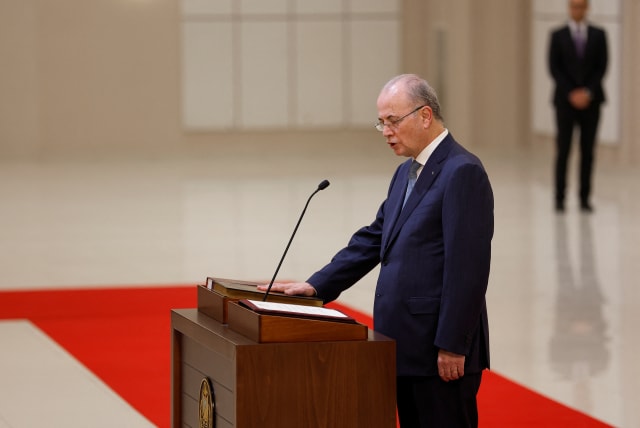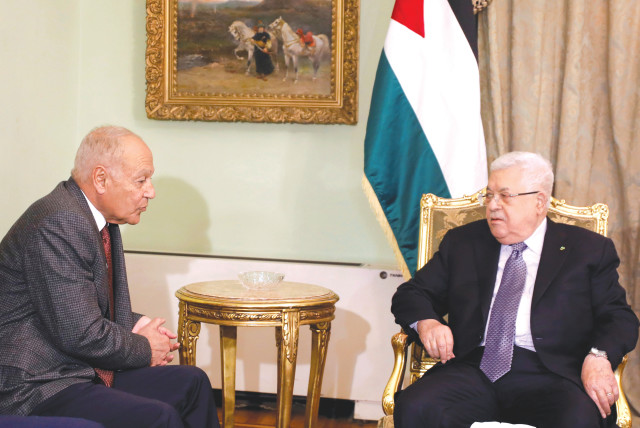New US-backed Palestinian Authority Prime Minister Mustafa forms cabinet

The US has welcomed the formation of a new Palestinian autonomy government, signaling its acceptance of the revised cabinet lineup as a step toward Palestinian political reform.
Palestinian Prime Minister Mohammad Mustafa formed a new cabinet on Thursday in which he will also serve as foreign minister and prioritize an immediate cease-fire and Israeli withdrawal from Gaza, Palestinian news agency WAFA reported.
Amid mounting pressure from the US, Palestinian Authority (PA) President Mahmoud Abbas appointed Mustafa, a US-educated economist and his longtime financial adviser, as premier this month with a mandate to help reform the PA, which exercises limited self-rule in the West Bank.
The politically unaffiliated 70-year-old Mustafa has ample experience in economics but little in politics.
The 19th Palestinian government was born with remarkable speed, as Mustafa presented the list of his cabinet formation and its work program to President Abbas, who gave it confidence.
The government includes 23 ministers, including ministers from Gaza, the most famous of whom is Sharhabeel al-Zaeem, who holds the justice portfolio.

While Mustafa kept the Foreign Affairs Ministry for himself, he created a Foreign Affairs and Expatriates Ministry, entrusting it to Varsen Aghabekian. The Interior Ministry went to Ziad Hab al-Reeh, the Finance Ministry to Omar al-Bitar, and Ashraf al-Awar was appointed as Jerusalem Affairs Minister.
The new government’s program confirmed that its political reference is the Palestine Liberation Organization (PLO) and will follow and respect all previous agreements signed by the PLO.
Mustafa also created the Industry and Planning Ministries following their merger with the Finance Ministry. A State for Relief Affairs Ministry was also created to focus on the Gaza Strip.
Sources close to Mustafa told Al-Modon that the creation of the new ministries is not an international request but, rather, they are aligned with the prime minister’s vision regarding the files he will focus on in his government’s work program.
A Ramallah-based PA official who requested anonymity because he was not authorized to speak on the matter, told The Media Line that Mustafa’s new government has regional, American and European approval and that “meeting US approval was essential.”
Most of the names of the ministers in the new government are unknown to the Palestinian public, except for Interior Minister Ziad Hab al-Reeh.
According to The Media Line sources, Fatah and other factions aren’t happy with the choice of Mustafa as PA prime minister and are suspicious of his government.
“That’s understandable given the pressure emanating from Washington,” Ramallah-based political analyst Fares Sarfandi told The Media Line.
“A lot of things are unclear, and the PA is at a junction. If it stands up to the US and moderate Arab governments, then they risk being sidelined,” said Sarfandi.
America's acceptance, possible support for "revitalized" PA
The US has welcomed the formation of a new Palestinian autonomy government, signaling its acceptance of the revised cabinet lineup as a step toward Palestinian political reform.
The Biden Administration has called for “revitalizing” the West Bank-based PA in the hopes that it can also administer the Gaza Strip once the Israel-Hamas war ends. The war erupted nearly six months ago, triggered by an Oct. 7 Hamas attack on southern Israel.
In a statement late Friday, US State Department spokesperson Matthew Miller said that the US looks forward to working with the new group of ministers “to deliver on credible reforms.”
“A revitalized PA is essential to delivering results for the Palestinian people in both the West Bank and Gaza and establishing the conditions for stability in the broader region,” Miller said.
According to US-based Middle East expert Hasan Awwad, “The US position is clear, it wants the PA to replace Hamas in the Gaza Strip, and it wants it to resume its responsibilities in the coastal enclave,” in the so-called “day after” scenario, he told The Media Line.
Awwad added with the lack of popularity of President Abbas, he was “forced” to take steps to satisfy all to keep his rule.
In an op-ed published in November, US President Joe Biden wrote that an end to the current war “is not peace.” Lasting peace and stability could be achieved through a reunited Gaza Strip and West Bank, governed under “a revitalized Palestinian Authority,” Biden wrote.
However, Israeli Prime Minister Benjamin Netanyahu’s government does not trust the PA to pursue peaceful coexistence. Netanyahu opposes a two-state solution and is hoping to cultivate a new technocratic leadership in Gaza as an alternative to the PA.
The 88-year-old Abbas was elected president of the PA in January 2005, shortly after the death of his predecessor, Yasser Arafat. That was the last time the Palestinians held a presidential election. He has led the PA for 18 years but has only limited authority over the West Bank and none over Gaza, where the PA was violently ousted by Hamas in 2007.
The PA’s popularity is waning among Palestinians, with a recent poll published by the Palestinian Center for Policy and Survey Research showing dismal support in the West Bank for Fatah.
Hamas has warned Palestinians in Gaza against cooperating with Israel to administer the territory, saying anyone who does will be treated as a collaborator, which is understood as a death threat. Hamas has rejected the formation of the new Palestinian government as illegitimate, calling instead for all Palestinian factions, including Fatah, to form a power-sharing government ahead of national elections.
